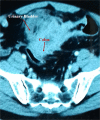Bladder Invasion in Patients with Advanced Colorectal Carcinoma
- PMID: 30538386
- PMCID: PMC6265181
- DOI: 10.1007/s13193-018-0788-9
Bladder Invasion in Patients with Advanced Colorectal Carcinoma
Abstract
Involvement of the bladder by colorectal cancer is sufficiently rare to be encountered by an individual surgeon on an infrequent basis. Extirpative procedures for advanced colorectal cancers can involve partial/total bladder resections. In patients without evidence of distant metastatic disease, a reasonable therapeutic effect can be expected when negative surgical margins are obtained. The decision to perform a bladder-sparing procedure or a total pelvic exenteration (TPE) will be based on the extent of the primary lesion as well as patient characteristics. In this study, we report our experience in the management of operable locally advanced colorectal carcinomas involving the urinary bladder. We retrospectively reviewed the hospital records of all patients with advanced colorectal cancer invading the urinary bladder. The age, gender, clinical presentation, physical examination findings, and imaging records were noted. Colonoscopy reports and images were noted and biopsy findings recorded. Similarly, cystoscopy findings and biopsy reports were noted and analyzed. Eight (88%) patients had a primary sigmoid tumor and one (11%) had primary rectal tumor. The clinical staging of the primary tumor was T3 in three (33%) and T4 in six (66%). A biopsy taken during cystoscopy confirmed the malignant lesion in all the nine patients. Four (44%) patients received neoadjuvant chemotherapy with 5-fluorouracil. Eight (88%) patients underwent bladder-sparing resection and the remaining one underwent total pelvic exenteration with ileal conduit for urinary drainage. The mean overall survival was 44 months. The wide spectrum of possible bladder involvement by colorectal cancer requires individual patient-specific and disease-specific approaches. En bloc bladder resection for adherent or invading colorectal cancers achieves good local control and prognosis. The potential for cure in completely excised, node-negative tumors is good. Bladder reconstruction is achievable in most patients.
Keywords: Bladder sparing; Colorectal cancer; Local control; Urinary bladder.
Figures




References
-
- Eldar S, Kemeny MM, Terz JJ. Extended resections for carcinoma of the colon and rectum. Surg Gynecol Obstet. 1985;161(4):319–322. - PubMed
LinkOut - more resources
Full Text Sources
Research Materials
